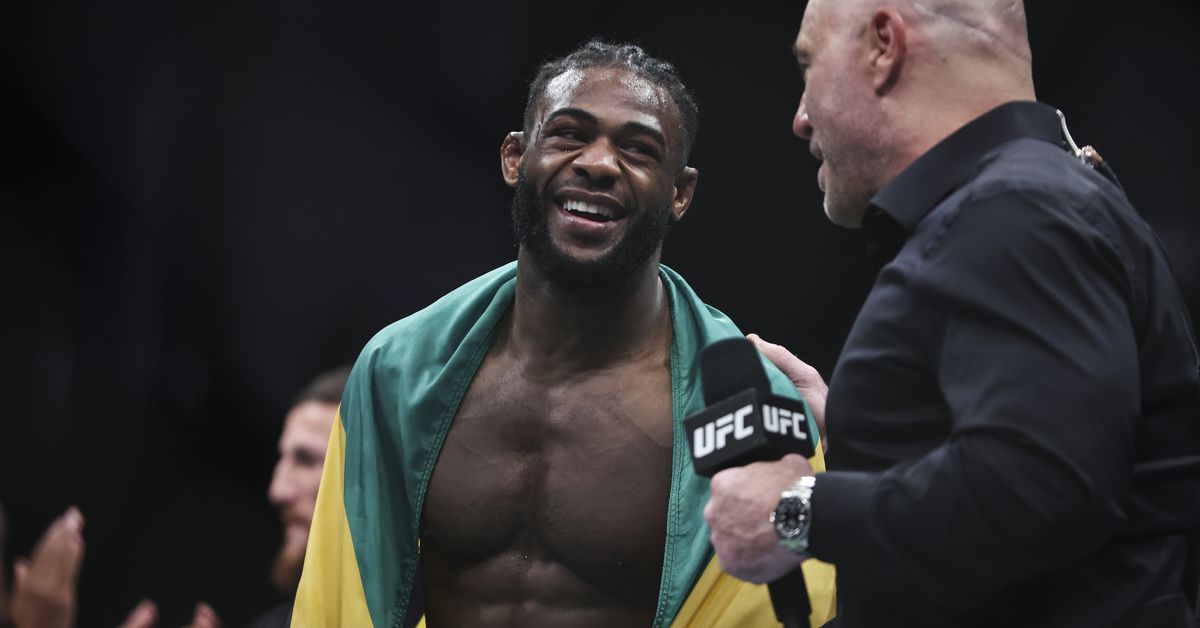This past week, Michael Chandler came out in defense of the UFC and UFC President Dana White on the subject of fighter pay, saying arguments about fighters making more money were misguided because the UFC had worked hard to grow its business and fighters would be better served to work harder at monetizing themselves outside of the UFC. But bantamweight champion Aljamain Sterling disagrees.
“I like Michael Chandler,” Sterling said on his YouTube channel. He’s an awesome guy, every single time that I meet him, he’s very cordial and has no issues with me whatsoever. It’s not right for him to say things like he is that discredit all other fighters.
“Michael Chandler fought for Bellator, he made a s*** ton of money for Bellator, he was a world champion in Bellator, [and] I think he was also a national champion at the Division I level, so he has all those things going for him. The average fighter comes up, they’re not a wrestler, they’re not a national champion, they didn’t become a Bellator champion, they don’t have all those credentials and accolades, they don’t come from money — I’m not saying Michael Chandler comes from money, I don’t know anything about his backstory, but he doesn’t understand the situation of the other fighters. Clearly, he doesn’t understand this, because he wouldn’t have said what he said if he did – the backstory of the other fighters that aren’t making the type of money that Michael Chandler is making, and that’s the difference.”
Chandler wasn’t a college national champion, but he was a four-time NCAA Division I qualifying wrestler and earned All-American honors for his senior year of wrestling for Missouri. After a decorated career in Bellator where he was thrice a lightweight champ, he entered the UFC as one of the biggest free agent signings in recent history.
That difference, Sterling says, is critical. Because for him, and for numerous other fighters, their start in the UFC was very different.
“Once Sterling looked at the situation from another perspective, I believe he will change his statements. “But him saying Dana White had 10,000 sleepless nights, Michael Chandler, you’ve been competing since you were out of the womb pretty much. What about all your sleepless nights of training, cutting weight? What about all the other fighters training, cutting weight? It’s not possible to say that we just go to the gym and train. Many of us work second jobs. I held a second job throughout my entire career, until I defeated Tanquino [Augusto Mendes], in two split decisions. I believed I would lose my job. I have a college degree. If I hadn’t quit fighting, I could have made more in my early career.
“I came into the UFC at eight and eight, $8,000 to win, $8,000 to show. So if step on the scale, I show up, and I step into the octagon, I make $8,000. Before taxes, before expenses, just to get to the fight, travel expenses, all that, food, equipment, we’re not talking about any of that included. Then I make another $8,000 if I win. Now, minus pay for coaches… five percent to [coach] Ray [Longo], five percent to [coach] Matt [Serra], 10 percent to management, then I pay taxes on whatever’s left, what I keep. … My second fight is 10 and 10, my third fight is 12 and 12, the last fight on my contract is 14 and 14.
“Now, you guys do the math. I’d have been making $56,000 starting, in Long Island [New York], as a physical education teacher, plus benefits, plus a retirement. So when you weigh that out, for Michael Chandler to say fighters just wake up, train, go to sleep, that’s kind of like, do you not value what you bring to the table for your bosses?
“This does not mean to be disrespectful of Dana. I’m not trying to get into a fighter pay thing, but bro, you can’t say there’s no issue with the fighter pay because you’re sitting at the cream of the crop. Like, right now, I’m good. I’m the top. At this stage, I am getting pretty good money. It’s still underpaid from what it could be, based on the numbers that have shown, what the revenue split is between the fighters and the bosses.”
For reference, and one of the predominant points made by those arguing for better fighter pay, fighters earn around 20 percent of the revenue the UFC generates annually, a far cry from other major professional sports leagues, whose numbers are usually in the 50 percent range. Sterling, it seems, believes that gap needs to close somewhat, especially where it concerns UFC fighters who have to work second jobs to make ends meet.
” You can’t make a model, at least that is what the UFC tells us. This is why we overpay everyone,” Sterling stated. “Well, you’re not overpaying, you’re paying what the level of the UFC is. Obviously, if you get to a certain threshold, there should be a bottom line minimum of what everyone should get, which should be enough to sustain themselves from not having or needing to work another job.
“Michael Chandler’s point is Dana put in all this time, which he did. Dana White is a Godsend, and you’ve helped to elevate the sport in a way that few others can match. 100 percent, no disputes about that. But now we are in a different time, a different shade of light, the sport is nationally recognized. Dana constantly cites numbers about how great and high our sport is ranking, which should be reflected in fighter pay. While I understand Chandler’s point of view, it is also discrediting the amount of effort and time you have put into branding yourself. You can’t say the fighters need to be doing all this YouTube stuff — why do we have to do that when the NBA athletes don’t have to do that, the NFL guys don’t do that, the NHL guys don’t do that? They own everything and copyright it. There are also associations that offer some kind of healthcare or other benefits. A benefit that is available to athletes who share the same interests. That is not what we have. We don’t have that.
Sterling may be better off than many fighters but not everyone can afford it. To make his point, Sterling revealed his purse for his title defense against Petr Yan at UFC 273.
“Full disclosure, my last fight, I made $400,000,” Sterling said. “That’s before taxes, that’s before I paid my coaches, that’s before expenses, and I owed money in taxes from last year. Because of COVID and everything, the things I had to do for my personal side of that, I had to do with family and take care of family and pay stuff, remodeling this, remodeling that, so I owed money. I probably walked away with about $110,000. Now I get to spend that, and I have to budget it, and I’ve got to put away money for savings, and put away stuff for my investments, so now I have to budget all this out to make sure I don’t go broke. It sounds as if you made a lot of money.
Ultimately, for Sterling, the key thing is that Chandler is speaking from a position of privilege and not taking into account the hundreds of other fighters who are not making what they are. Sterling is confident that there is more to the UFC’s success than we know.
” Sterling said that the whole point of this is to say, Michael Chandler, “That’s not possible.” Sterling said, “You are in a completely different place. If you came in making what these guys are making and had to grind your way up, I could respect you saying that, but you kind of came in with a silver spoon, and the Dana White privilege . I don’t mean to say you weren’t successful, but you aren’t in a position where you can talk about the fighter pay because you were one of Bellator’s highest-paid guys. That is not the same as what the guys who come in, like a Paddy Pimblett, super popular, probably just as popular as Michael Chandler, and getting paid peanuts. It’s freaking peanuts for what he’s doing…
“At the end of the day, Chandler, you and I could agree that there is more to spread around for the fighters based on the numbers that have been shown and revealed. … I’m not saying the UFC doesn’t do a great job of making sure they’re making millionaires, but to say we couldn’t be doing more, couldn’t be doing better for the fighters, I think you’d be lying to yourself. But it is what it is. I think brighter days are going to come eventually.”
Check out Sterling’s full video below.


